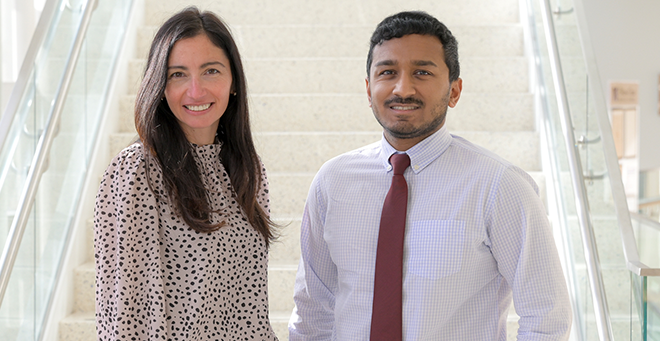
Photo: Bryan Goodchild
A large-scale trial at UMass Chan Medical School will assess the effectiveness of a digital lifestyle change intervention for patients using GLP-1 therapies to manage obesity, diabetes or cardiovascular disease.
The study will launch the Lifestyle Change Implementation Research Network Collaborating Center at UMass Chan’s Prevention Research Center, funded through a four-year, $2 million award from the Centers for Disease Control and Prevention. The project is co-led by Jamie Faro, PhD, assistant professor of population & quantitative health sciences and Stephenie C. Lemon, PhD, the Barbara Helen Smith Chair in Preventive and Behavioral Medicine, professor of population & quantitative health sciences, chief of the Division of Preventive and Behavioral Medicine and co-director of the Prevention Research Center at UMass Chan.
“We’re going to look at what patients using GLP-1s are experiencing from early on in their journey, including changes in physical activity, diet, skeletal muscle mass, side-effect management, medication adherence and quality of life,” Dr. Faro said. “We are hopeful this study addresses how lifestyle change interventions can impact these areas when implemented alongside patient’s medication.”
Enrollment in the study will start in early 2026, with a focus on patients in the Worcester area. The study will enlist 220 participants, using the digital lifestyle change program Noom Weight and Noom’s GLP-1 Companion, designed to meet the needs of people using GLP-1 therapies, compared with standard care. Those participants in standards care will be offered the option to receive the intervention at the end of the study.
Participants in both groups will receive a wearable device to track their physical activity over eight months and will be asked to complete health and lifestyle-related questionnaires and dietary recalls. Dietary assessments will be led by co-investigator Sabrina Noel, PhD, RD, associate professor of biomedical and nutritional sciences and the director of the Center for Population Health and the Health Assessment Laboratory at UMass Lowell.
“There needs to be more scientific evidence on how lifestyle change interventions can support patients’ needs in real-world settings,” Faro said. “The team laid the groundwork for this project by conducting pilot projects in UMass Memorial Health clinics, funded by the UMass Chan Ambulatory Research Consortium and the Mel Cutler pilot award in the Department of Population & Quantitative Health Sciences.”
The project will also examine lifestyle change implementation across multiple levels, including implementation with health care systems and providers and payors.
“We want to establish evidence that can be applicable in other contexts that helps patients understand and engage in these necessary lifestyle interventions,” Dr. Lemon said. “Otherwise, we’re going to have a population of GLP-1 users who lose weight but lose their muscle mass or have other issues that could be helped with lifestyle interventions, or who come off these meds and need additional support as they regain weight.”
UMass Chan is one of four funded sites to receive a Lifestyle Change Interventions Research Network Coordinating Center Special Interest Project award from the CDC. The others include the University of Utah, University of Pittsburgh and University of South Carolina. The sites are conducting their own individual projects, each focused on filling evidence gaps identified by the CDC, in their own communities and states.
The new center at UMass Chan will work with the CDC’s Coordinating Center and other Prevention Research Centers in the national network to advance research and practice, promoting sustainable, evidence-based lifestyle change interventions and reductions in obesity, diabetes, cardiovascular disease and other chronic conditions.
“The goal of the network is to bring together researchers and practitioners from across the country who are interested in this field, with a goal of building knowledge and capacity for implementing advanced weight loss interventions and potentially doing small scale additional research studies that fill evidence gaps in partnership between researchers and practitioners,” Lemon said.
Other UMass Chan faculty involved in the study include co-investigators Varun Ayyaswami, MD, assistant professor of medicine; Jung Ae Lee, PhD, assistant professor of population & quantitative health sciences; Ben Gerber, MD, MPH, professor of population & quantitative health sciences; and Melissa Goulding, PhD’23, MS, assistant professor of population & quantitative health sciences; and Jeevarathna Subramanian, MD, associate professor of medicine. Additional team members include research program manager Jessica Wijesundara, MPH; and clinical research coordinator Reem Najjar of the Department of Preventive & Quantitave Health Sciences; and Amy Borg, MPH, MEd, deputy director of the Prevention Research Center.

